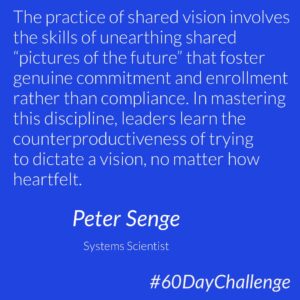 Welcome to Day #6 of the #60DayChallenge! See this post if you need to be brought up to speed!
Welcome to Day #6 of the #60DayChallenge! See this post if you need to be brought up to speed!
OK…let’s dive in…🌊🌊🌊
—–
In a recent talk by futurist Andy Hines, he shared four types of values for the future he’s distilled from the World Values Survey. I haven’t dug into the validity of the assertions, but I think it’s an interesting frame for K12 transformation. Curious what you think…..!
People embrace four types of values:
Traditional: “Follow the rules.”
Focused on following the rules and fulfilling one’s predetermined role, with priorities such as respect for authority, religious faith, national pride, obedience, work ethic, large families with strong family ties, and strict definition of good and evil.
Modern: “Achieve.”
Focused on achievement, growth and progress, with priorities such as high trust in science and technology (as the engines of progress), faith in the state (bureaucratization), rejection of out-groups, an appreciation of hard work and money, and determination to improve one’s social and economic status.
Postmodern: “What’s it all mean?”
Focused on the search for meaning in one’s life, with priorities such as self-expression, including an emphasis on individual responsibility as well as choice, imagination, tolerance, life balance and satisfaction, environmentalism, wellness, and leisure.
Integral: “Make a difference.”
Emerging as the leading edge of values change, with a more practical and functional approach to employing values that best fit the particular situation, enabling one to pursue personal growth with an understanding and sensitivity to larger systemic considerations.
Hines went on to share the following percentages of where the US population falls within each category:
Traditional: 33%
Modern: 40%
—-
Postmodern: 25%
Integral; 2%
This got me wondering about the challenges of transformation in a society where over 70% shy away from the values that (seem to me to) drive the need for such transformation.
There is far more complexity to these ideas than space in a short post, and I hope we can explore more together in the comments below.
—–
❓ Provocations:
If “human-centered” is one of our key principles in leading transformation, how does a values framework shed light on how we can be more effective at understanding our stakeholders? Does the values framework help explain the slow pace of transformation in K12? How might we lead differently?
💎 Resources:
🧠 Mindset:
Values
💡 Area:
Leadership
📣 Drop your thoughts in the comments or in the Facebook group, and feel free to share resources. 🔥🔥🔥
- A silver lining - January 22, 2022
- Is our use of tech working against us? 🤔 - September 8, 2021
- What’s NOT going to change in the next 10 years? 🤔 - September 7, 2021